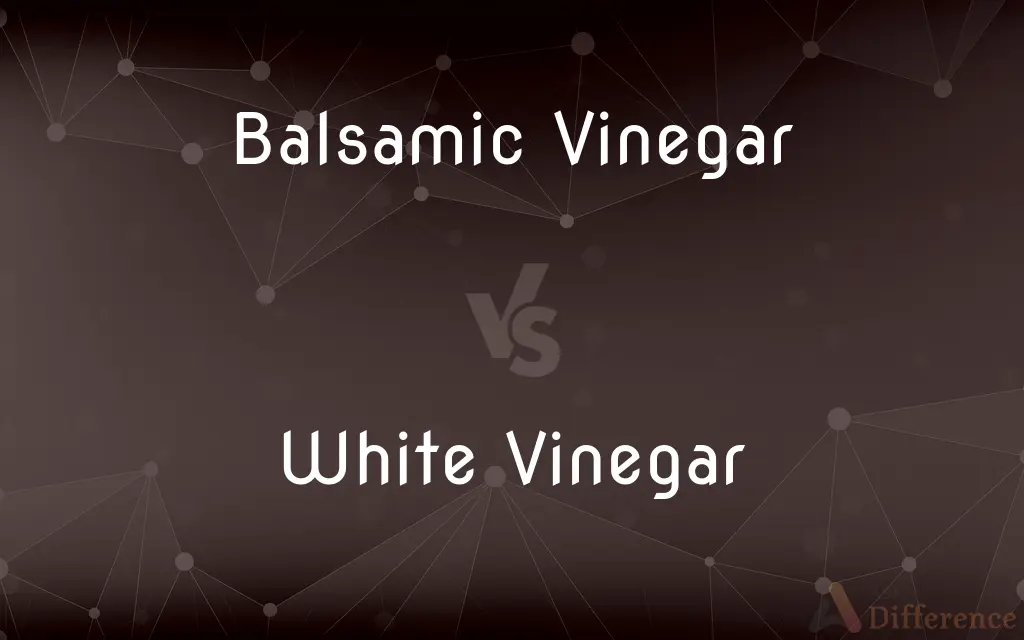Balsamic Vinegar vs. White Vinegar — What's the Difference?
By Tayyaba Rehman — Published on November 24, 2023
Balsamic Vinegar is dark, sweet, and has a complex flavor, originating from Italy, while White Vinegar is clear, sharp, and acidic, widely used in various culinary and cleaning applications.

Difference Between Balsamic Vinegar and White Vinegar
Table of Contents
ADVERTISEMENT
Key Differences
Encountering Balsamic Vinegar, one is met with a rich, dark, and slightly sweet flavor that markedly contrasts with White Vinegar. In the latter, clarity, and a distinctly sharp and acidic profile are prominent, steering its applications diversely in both culinary and non-culinary uses.
Balsamic Vinegar, traditionally made in Modena, Italy, undergoes a meticulous aging process in wooden barrels, infusing it with a complex flavor profile. White Vinegar, however, is fermented quickly, utilizing a distilled alcohol base, and represents simplicity and versatility in its acidic purity.
The culinary applications of Balsamic Vinegar often lean towards dressings, glazes, and flavor enhancement in cooked dishes. In contrast, White Vinegar finds its place in pickling, baking, meringue stabilization, and also as a cleaning agent, given its robust acidic nature.
When exploring their derivations, Balsamic Vinegar begins its journey from the pressed grapes' must, contributing to its inherent sweetness. White Vinegar’s birth, on the other hand, can stem from grains or ethanol, fostering a straightforward, undeviating acidity.
Visually, Balsamic Vinegar offers a depth and richness with its dark color and syrupy consistency, while White Vinegar maintains a clear, unassuming presence, easily blending into various recipes and cleaning applications without altering color aesthetics.
ADVERTISEMENT
Comparison Chart
Flavor Profile
Dark, sweet, complex
Clear, sharp, acidic
Origin & Production
Traditionally from Modena, Italy
Can be produced widely
Culinary Use
Dressings, glazes, enhancement
Pickling, baking, cleaning
Base Ingredient
Pressed grape must
Grains or distilled ethanol
Visual Appearance
Dark and syrupy
Clear and liquid
Compare with Definitions
Balsamic Vinegar
A condiment that has been produced in the regions of Modena and Reggio Emilia for centuries.
The tour included a visit to a traditional Balsamic Vinegar production house.
White Vinegar
A commonly used vinegar in pickling and culinary applications.
The pickles had a sharp taste, thanks to the White Vinegar brine.
Balsamic Vinegar
A dark, concentrated, and intensely flavored vinegar made from freshly crushed grape juice.
The salad was drizzled with aged Balsamic Vinegar, enhancing its taste.
White Vinegar
A versatile household item often used for cleaning due to its acidic nature.
To clean the windows, he mixed water with White Vinegar for a streak-free shine.
Balsamic Vinegar
A sweet and tangy vinegar often used in salad dressings, marinades, and glazes.
The chef used Balsamic Vinegar to create a reduction sauce for the steak.
White Vinegar
A neutral-flavored vinegar that's a staple in many kitchens.
White Vinegar is a key ingredient in her secret coleslaw recipe.
Balsamic Vinegar
An Italian vinegar that undergoes a long aging process in wooden barrels.
Authentic Balsamic Vinegar from Modena is a prized ingredient in gourmet kitchens.
White Vinegar
A cost-effective and eco-friendly solution for various household chores.
To remove the stain, she soaked the fabric in a mixture of water and White Vinegar.
Balsamic Vinegar
A vinegar known for its complex flavor profile and velvety texture.
A splash of Balsamic Vinegar can elevate the simplest of dishes.
White Vinegar
A clear vinegar made by fermenting distilled alcohol.
She used White Vinegar to create a tangy homemade vinaigrette.
Common Curiosities
Can I use White Vinegar in salad dressings?
Yes, White Vinegar can be used in dressings, offering a sharp and clean acidic note.
Why is Balsamic Vinegar sweet?
Balsamic Vinegar is sweet due to the sugar content in the grape must from which it's made.
Can I replace Balsamic Vinegar with White Vinegar in recipes?
They can replace each other with adjustments for sweetness and acidity, but flavor profiles will change.
Is White Vinegar derived from grapes?
No, White Vinegar is typically derived from grains or distilled ethanol.
Is Balsamic Vinegar always dark?
Traditional Balsamic Vinegar is dark due to the aging process and the grape must used.
Is White Vinegar used in baking?
Yes, White Vinegar can be used in baking to stabilize egg whites, curdle milk, or interact with baking soda.
How is Balsamic Vinegar made?
Balsamic Vinegar is made from pressed grape must, aged in wooden barrels.
Is White Vinegar suitable for cleaning?
Yes, White Vinegar’s high acidity and clear color make it suitable for cleaning purposes.
What dishes are best for Balsamic Vinegar?
Balsamic Vinegar shines in salads, glazes, and dishes that benefit from its sweet, complex flavor.
What is the pH level of White Vinegar?
White Vinegar typically has a pH level of around 2.5, making it quite acidic.
Can Balsamic Vinegar be used for cleaning?
It can, but its dark color and sweetness might not make it the best choice for all cleaning purposes.
Does Balsamic Vinegar need to be refrigerated?
No, Balsamic Vinegar does not require refrigeration and can be stored like other vinegars.
How should White Vinegar be stored?
White Vinegar should be stored in a cool, dark place, and it has a virtually indefinite shelf life.
Is White Vinegar safe for consumption?
Yes, White Vinegar is safe for consumption and is used in various recipes.
Why is Balsamic Vinegar often more expensive?
The aging process and production methods for Balsamic Vinegar often justify a higher price.
Share Your Discovery

Previous Comparison
American Football vs. Canadian Football
Next Comparison
Cranes vs. HeronsAuthor Spotlight
Written by
Tayyaba RehmanTayyaba Rehman is a distinguished writer, currently serving as a primary contributor to askdifference.com. As a researcher in semantics and etymology, Tayyaba's passion for the complexity of languages and their distinctions has found a perfect home on the platform. Tayyaba delves into the intricacies of language, distinguishing between commonly confused words and phrases, thereby providing clarity for readers worldwide.











































